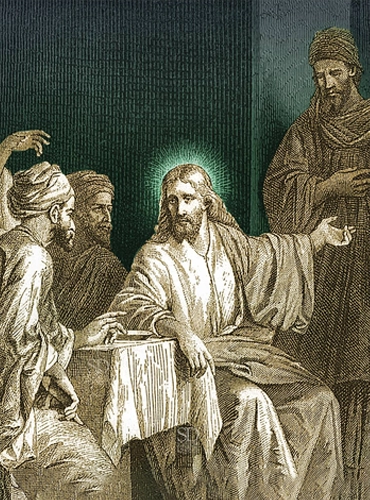Friday of the Thirtieth Week in Ordinary Time – Lk 14:1-6
In today’s Gospel, Luke presents us with yet another scene involving Jesus and the Pharisees, this time a Sabbath meal where Jesus heals a sick man. There are two things that call our attention:
- First, we have the example of Jesus. Christ “went to dine,” meaning, it was His choice to go to Pharisee’s house; no one forced Him. Surely he was invited, but, as we’ve seen over the past few weeks, the Pharisees were no friends of Jesus; He would have known their intentions, but He seems to ignore them. Their dishonesty and evil motives don’t prevent Jesus from going to meet the Pharisees where they are at, both in terms of a physical location, and in terms of their moral attitudes.
- Secondly, we can contrast this action with the attitude of the Pharisees, who are clearly looking to trap Jesus. The Greek word Luke uses to describe what the Pharisees are doing, παρατηρέω (parateréo), can mean both to keep a close eye on, and to scrupulously observe in practice; in other words, it means to observe closely, both in the sense of vision, and in the sense of legal observance of the law. We could say that the close legal observance of the Pharisees blinds them, and prevents them from seeing what Jesus is actually doing; their close eye on Jesus is tainted or marred by their legalistic vision of life. Likewise, when the Pharisees are “unable to answer,” Luke uses the word ἀνταποκρίνομαι (antapokrínomai), which means “unable to contradict” or “unable to dispute.” In other words, the Pharisees wanted an argument; they wanted to have a fight, but, as they realized, against charity, there is no defense.
There are two things we can take away from this. First, from Jesus’ example of dining with the Pharisees, we see how, in the words of Saint Therese of Lisieux, “true charity consists in bearing all our neighbors’ defects, not being surprised at their weakness, but edified at their smallest virtues.” Jesus knew, of course, that the Pharisees were up to no good, but He nonetheless accepted their invitation to come and dine with them; He was edified by that small act of kindness, and set aside the dubious motives of the Pharisees. This is because their souls were worth saving and worth putting up with their obnoxiousness. As Chesterton put it, “The Bible tells us to love our neighbors, and also to love our enemies; probably because generally they are the same people.” We don’t pick our neighbors, but we can decide whether or not to deal with them. We can ask ourselves: do we embrace those opportunities to really practice charity, especially with members of our community?
Secondly, from the Pharisees we see the dangers of attachment to anything that isn’t God. In fact, we see that the Pharisees really didn’t care about the law; if they had wanted to defend the law, they would’ve at least attempted an answer to Jesus’ questions. Instead, they just wanted to find fault, and so missed the opportunity to understand the law and, more importantly, God’s love which displays itself in such a marvelous way on the Sabbath. As Saint Mother Teresa of Calcutta would say, “If you judge people, you have no time to love them.” We can ask ourselves: are we attached to our own judgments of others, to our own way of seeing them?
Today, let us pray for the grace, through the intercession of Mary, Mother of Charity, to truly love our neighbors out of love for Christ.






